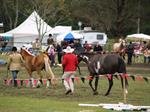 Some people love to make things from inanimate objects more than spend time interacting with other people. Some might say they prefer the company of animals to people. However, it is important to stress that working with animals also involves working with people. It could involve giving keeper talks if you are working in a zoo, advising people about pet care if you are working in a pet shop or dealing with anxious owners if you are working in a kennels or cattery or in a Veterinary Surgery. In general, wherever there are animals there are people too, so it is important to realise that a career with animals will also involve interacting with the public.
Some people love to make things from inanimate objects more than spend time interacting with other people. Some might say they prefer the company of animals to people. However, it is important to stress that working with animals also involves working with people. It could involve giving keeper talks if you are working in a zoo, advising people about pet care if you are working in a pet shop or dealing with anxious owners if you are working in a kennels or cattery or in a Veterinary Surgery. In general, wherever there are animals there are people too, so it is important to realise that a career with animals will also involve interacting with the public.
- Animal trainers are employed by animal owners. The owner will be employing them to train the animal to act in a certain way. The value of their training will depend upon how well they understand the owner
- .An animal lover who loves interacting with animals, may be suited to serving in a pet shop if they have difficulty dealing with the people who are customers.
- A zookeeper may spend a lot of time dealing with animals, but some tasks can require a high level of cooperation with fellow worker; particularly when dealing with large animals.
- A farmer may spend a lot of time alone with animals; particularly on a small farm; but most farmers are also small business owners who need to be able to manage every aspect of the farm, from water resources and equipment to finance, marketing and contracting employees.
- Animal conservationists need to engage public opinion in support of their activities; whether through the media, giving talks or fund raising.
- Academic careers with animals may include teaching or research. Teachers need to be good communicators, to connect with their classes. Researchers need to collaborate with colleagues; and poor communication skills will result in diminished research outcomes.
Clearly, a career working with animals should not be approached as a way of escaping the need to interact with other people. Working with animals almost always involves working with people too.
 Put Your Mind in the Future, Not the Past
Put Your Mind in the Future, Not the Past
Many people look at jobs people are doing today; or which they did in the past; and have a perception of what that job might be like, based upon today or yesterday. The world doesn’t work that way anymore though. The way we work, the equipment and techniques we use and the actual jobs we do are changing faster than we can predict in today’s world.
It is a mistake to look at a vet, zookeeper or farmer and think “I want a job exactly like that”
Tomorrows veterinarians may be using wearable computer technology to remotely diagnose and prescribe treatments for animals. Farmers and zookeepers may be using automated machinery or robotics more than they do today. Farm produce may be grown, harvested, processed and marketed in very different ways in the future. There is very little that is not subject to change. This does not mean everything in the world is going to change. It does mean though that a career with animals is likely to see continual change and in order to be successful in such a career, you will need to be prepared for. The most successful people are likely to be those who not only accept change; but are proactive about change; staying up to date with trends, information and technology; looking out for opportunities and being amongst the first to act on new opportunities as they arise.
Forward thinking, networking and attitude may be just as important to your success, as what knowledge and experience are.
Getting Trained
Getting trained should be all about learning
- learning to understand animal biology and husbandry;
- learning how to do things that are needed in a workplace (not just skills with animals, but skills with other things like equipment, computers, office equipment, communicating with people)
- learning self confidence, problem solving, to work to specification (attitudes and habits need to be right for the job)
- learning to network with organisations and individuals in the industry.
Reading books is one part of learning; studying courses is another; and there are lots of other pieces as well. A good "experiential" based training program can help you toward much of what is needed. Some courses are far more limited in how much they can help.
Getting qualified is sometimes necessary and sometimes not; but getting trained properly is always necessary if you want to progress in a career and optimise you chanced for success.
Extract from ebook - Working with Animals.